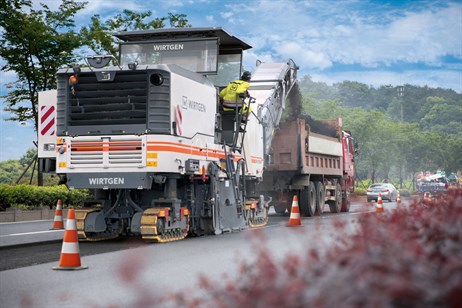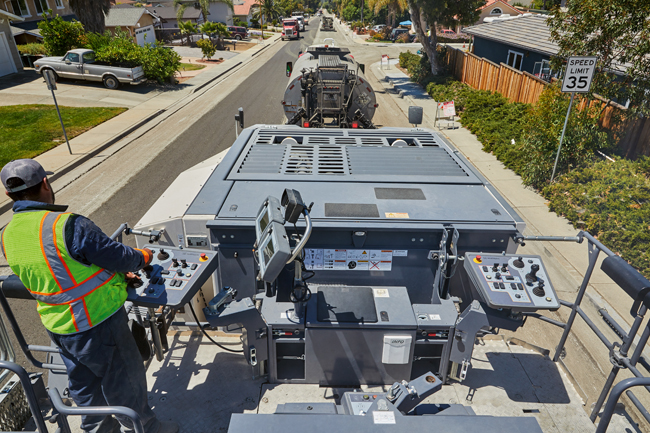
The latest milling machines offer greater efficiency and safety, with gains in productivity, reduced downtime and lower environmental impact. Manufacturers have made great advances in developing new equipment models that deliver gains in performance.
From
However, the problem with this method according to BOMAG is that micro particles can end up hanging in the air around the machine, taking several hours to fall back to the ground. And it is these micro particles that provide a hazard to human health with a potential for causing lung or heart damage once they enter the body. But by ensuring that the micro particles are positively charged, BOMAG’s Ion Dust Shield ensures that the micro particles stick together so that they are larger and do not hang in the air. Moreover, as the particles are larger they also will not enter the lungs or heart.
According to BOMAG, this patented system reduces dust by 80%. Any dust settling on the machine can be simply washed off at the end of a shift as the particles will remain stuck together. A spokesperson for the firm said, “This is not a filter, so there’s no need to dispose of a contaminated component.” The spokesperson continued, “We have a system that converts dangerous micro particles into non-dangerous large particles.”
The system is being introduced first on the firm’s smaller milling machines as these are typically used for operations in urban locations, where there may be concerns about dust.
Caterpillar has developed its new K-Style milling machine drums. A spokesperson for the firm said, “These are available for both the large and small cold planers.”
The key feature is the new tool holder system. This is designed so that the tool can still rotate freely, while the holder remains fixed securely in place. According to the firm’s spokesperson, this ensures that the holder is not at risk of being thrown out from the drum during use as it becomes worn. The new tempered retention system is said to be easy and quick to use, no longer requiring the need for a securing bolt at the rear.
The tool holders are also more rugged than previously, with a heavy-duty design. Meanwhile, the paddle units fitted to the drum are also double-sided, allowing them to be reversed and doubling overall working life. The firm is also widening its range of drum options to suit a range of working conditions, such as offering standard carbide tools as well as diamond tools.
Wirtgen has rounded out its new large milling machine series for the Asian market by unveiling the W 195 and W 205. In addition, the third and most powerful machine in the series, the W 215, is also being introduced to the Chinese market. The W 195 weighs in at 29.16tonnes and cuts a 2m width, with power from a diesel delivering 410kW. The W 205 also cuts a 2m width but weighs 30.1tonnes and is powered by a 455kW diesel. Meanwhile, the W 215 model weighs in at 30.29tonnes and cuts a 2m width, with power from its 470kW diesel.
Wirtgen claims that its new W 380 Cri cold recycler is highly sophisticated and productive. The machine can carry out cold recycling duties for widths of 3.2m, 3.5m and 3.8m, typically working to depths of 100-330mm. The company claims that this machine can be used to repair damaged road stretches quickly and effectively, providing a quality finish while minimising the need for materials transport to and from the site by 90%. This process is said to be energy-saving, allowing the saving of 10-12litres of fuel/tonne of materials, as well as reducing the need for binders by 50%.
The machine uses the proven cold recycling process, recycling surface and base course material, as part of a recycling train operating across the entire width of the pavement in a single pass. The machine is used to granulate road material and transform it into a new, homogeneous material mixture by adding binding agents such as cement, bitumen emulsion, or foamed bitumen. It can remove an asphalt surface either in full or in layers as required by the road condition.
With a mixing capacity of up to 800tonnes/hour, the cold recycler can feed recycled material to an asphalt paver through its rear-mounted swivel-mounted and height-adjustable discharge conveyor, or the recycled material can be left on the ground for windrowing. Using the cold recycler allows long stretches of road to be repaired in a single day’s work. Final compaction is carried out by Hamm tandem and tyre rollers.
Wirtgen’s tracked recyclers use the down-cut process when recycling, with the milling and mixing rotor rotating in sync. The firm claims that this method allows the user to selectively vary the particle size of the material being processed.
In addition to the W 380 Cri model with its Stage V/Tier 4 Final compliant diesel delivering 775kW, there is also the Tier 2 compliant
W 380 CR for use in non-regulated markets. The new generation of Wirtgen recyclers also includes the W 240 Cri, which also has a 775kW diesel meeting Stage V and US Tier 4 Final emissions requirements, as well as the W 240 CR variant for non-regulated markets with a 708kW, Tier 2 compliant diesel.
The W 240 CRi and W 240 CR recyclers can also be equipped with integrated Vögele AB 375 T variable screeds and have a maximum working width of 2.35m.









